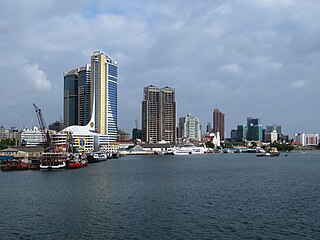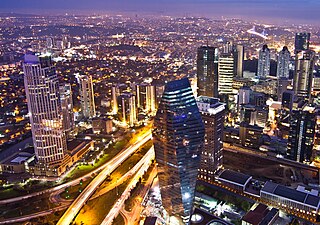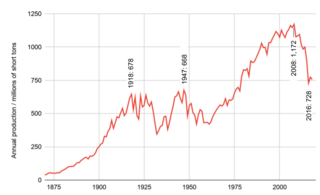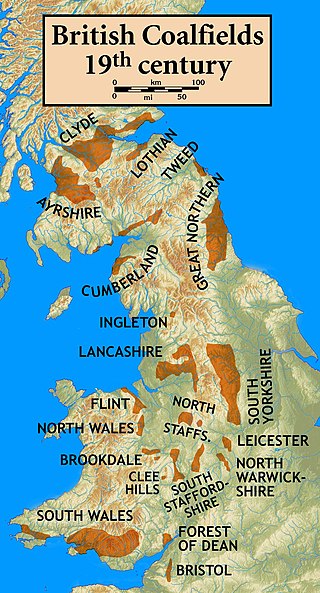
The economy of Botswana is currently one of the world's fastest growing economies, averaging about 5% per annum over the past decade. Growth in private sector employment averaged about 10% per annum during the first 30 years of the country's independence. After a period of stagnation at the turn of the 21st century, Botswana's economy registered strong levels of growth, with GDP growth exceeding 6–7% targets. Botswana has been praised by the African Development Bank for sustaining one of the world's longest economic booms. Economic growth since the late 1960s has been on par with some of Asia's largest economies. The government has consistently maintained budget surpluses and has extensive foreign-exchange reserves.

The economy of Tanzania is a lower-middle income economy that is centered around Manufacturing, Tourism, Agriculture, and financial services. Tanzania's economy has been transitioning from a planned economy to a market economy since 1985. Although total GDP has increased since these reforms began, GDP per capita dropped sharply at first, and only exceeded the pre-transition figure in around 2007.

Turkey is a founding member of the OECD and G20. The country's economy ranked as the 17th-largest in the world and 7th-largest in Europe by nominal GDP in 2024. It also ranked as the 12th-largest in the world and 5th-largest in Europe by PPP in 2024. Turkey is a developing, upper-middle income, mixed economy. Turkey has often been defined as a newly industrialized country since the turn of the 21st century. The country is the fifth most visited destination in the world, and has over 1,500 R&D centres established both by multinational and national firms. Turkey is among the world's leading producers of agricultural products, textiles, motor vehicles, transportation equipment, construction materials, consumer electronics, and home appliances. Among OECD nations, Turkey has a highly efficient and strong social security system; social expenditure stood at roughly 12.5% of GDP.

Coal mining is the process of extracting coal from the ground or from a mine. Coal is valued for its energy content and since the 1880s has been widely used to generate electricity. Steel and cement industries use coal as a fuel for extraction of iron from iron ore and for cement production. In the United Kingdom and South Africa, a coal mine and its structures are a colliery, a coal mine is called a "pit", and above-ground mining structures are referred to as a "pit head". In Australia, "colliery" generally refers to an underground coal mine.

The National Coal Board (NCB) was the statutory corporation created to run the nationalised coal mining industry in the United Kingdom. Set up under the Coal Industry Nationalisation Act 1946, it took over the United Kingdom's collieries on "vesting day", 1 January 1947. In 1987, the NCB was renamed the British Coal Corporation, and its assets were subsequently privatised.

The British Coal Corporation was a nationalised corporation responsible for the mining of coal in the United Kingdom from 1987 until it was effectively dissolved in 1997. The corporation was created by renaming its predecessor, the National Coal Board (NCB).
Consol Energy Inc. is an American energy company with interests in coal headquartered in the suburb of Cecil Township, in the Southpointe complex, just outside Pittsburgh, Pennsylvania. In 2017, Consol formed two separate entities: CNX Resources Corporation and CONSOL Energy Inc. While CNX Resources Corp. focuses on natural gas, spin-off Consol Mining Corporation, now Consol Energy Inc. focuses on coal. In 2010, Consol was the leading producer of high-BTU bituminous coal in the United States and the U.S.'s largest underground coal mining company. The company employs more than 1,600 people.
The mining industry in India is a major economic activity which contributes significantly to the economy of India. The gross domestic product (GDP) contribution of the mining industry varies from 2.2% to 2.5% only but going by the GDP of the total industrial sector, it contributes around 10% to 11%. Even mining done on small scale contributes 6% to the entire cost of mineral production. Indian mining industry provides job opportunities to around 700,000 individuals.
Hugo Hawksley Fitzthomas Summerson is a British Conservative politician.

The Banks Group Limited is a family owned business headquartered in Durham, but working across Scotland and the North of England, established in 1976. Banks develops and operates in a variety of business areas including property development, renewables generation, flexible energy generation and storage, and mineral extraction and infrastructure services. The Banks Group was founded by Harry Banks OBE DL with his brothers Graham Banks, Joe Banks and Bruce Banks.
British Coal Utilisation Research Association (BCURA) was a non-profit association of industrial companies, incorporated 23 April 1938 and dissolved 24 February 2015.
Arch Resources, previously known as Arch Coal, is an American coal mining and processing company. The company mines, processes, and markets bituminous and sub-bituminous coal with low sulfur content in the United States. Arch Resources is the second-largest supplier of coal in the United States, behind Peabody Energy. As of 2011 the company supplied 15% of the domestic market. Demand comes mainly from generators of electricity.

The Coal Authority is a non-departmental public body of the United Kingdom government sponsored by the Department for Energy Security and Net Zero (DESNZ). It owns the vast majority of unworked coal in Great Britain, as well as former coal mines, and undertakes a range of functions including:

Coal mining is an industry in transition in the United States. Production in 2019 was down 40% from the peak production of 1,171.8 million short tons in 2008. Employment of 43,000 coal miners is down from a peak of 883,000 in 1923. Generation of electricity is the largest user of coal, being used to produce 50% of electric power in 2005 and 27% in 2018. The U.S. is a net exporter of coal. U.S. coal exports, for which Europe is the largest customer, peaked in 2012. In 2015, the U.S. exported 7.0 percent of mined coal.
The economy of Utah is a diversified economy covering industries such as tourism, mining, agriculture, manufacturing, information technology, finance, and petroleum production. The majority of Utah's gross state product is produced along the Wasatch Front, containing the state capital Salt Lake City.

Mining in the United Kingdom produces a wide variety of fossil fuels, metals, and industrial minerals due to its complex geology. In 2013, there were over 2,000 active mines, quarries, and offshore drilling sites on the continental land mass of the United Kingdom producing £34bn of minerals and employing 36,000 people.

The Coal Industry Nationalisation Act 1946 was an Act of the Parliament of the United Kingdom which nationalised, or brought into state control, the coal industry in the United Kingdom. It established the National Coal Board as the managing authority for coal mining and coal processing activities. It also initially provided for the establishment of consumers' councils. The Coal Industry Nationalisation Act 1946 was the first of a number of Acts promulgated by the post-war Labour government to nationalise elements of the UK's industrial infrastructure; other Acts include the Electricity Act 1947; the Transport Act 1947 ; the Gas Act 1948; and the Iron and Steel Act 1949.

Coal mining in the United Kingdom dates back to Roman times and occurred in many different parts of the country. Britain's coalfields are associated with Northumberland and Durham, North and South Wales, Yorkshire, the Scottish Central Belt, Lancashire, Cumbria, the East and West Midlands and Kent. After 1972, coal mining quickly collapsed and had practically disappeared by the 21st century. The consumption of coal—mostly for electricity—fell from 157 million tonnes in 1970 to just 587,000 tonnes in 2023. Employment in coal mines fell from a peak of 1,191,000 in 1920 to 695,000 in 1956, 247,000 in 1976, 44,000 in 1993, 2,000 in 2015, and to 360 in 2022.

AAH Pharmaceuticals Limited is a pharmaceutical wholesaler in the United Kingdom. Originally formed in 1892 as a company selling solid fuels in South Wales, it was floated on the stock exchange in 1923. It diversified into pharmaceuticals in the 1970s. The company at one time was the leader in distributing drugs in the United Kingdom, have a 40% share in 2009.
Epos Now is a SaaS and payments services provider focusing on small and medium-sized businesses within the retail, hospitality, and personal care sectors. The company provides electronic point-of-sale systems and integrated payment and embedded finance services.












